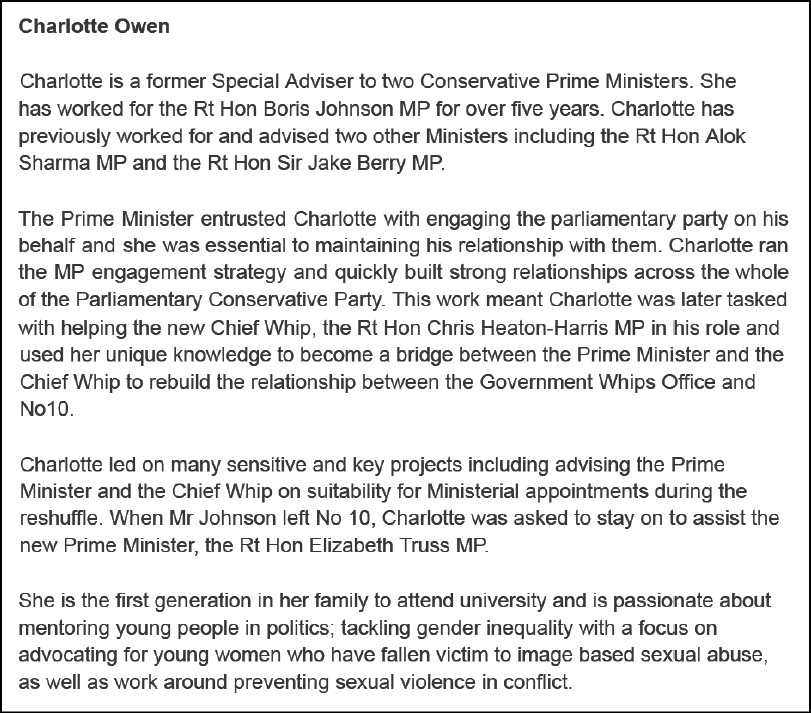After a freedom of information dispute lasting 18 months, I have finally obtained the official reasons Boris Johnson provided with his resignation honours list for giving peerages to Charlotte Owen and Ross Kempsell.
The reasons cited for nominating Owen to membership of the House of Lords do come across as very thin, inadequate and lacking in evidence of relevant achievements. They leave her peerage as a mystery rather than properly justifying and explaining it.
The justification which the former prime minister supplied to the House of Lords Appointments Commission states that Johnson “entrusted Charlotte with engaging the parliamentary party on his behalf and she was essential to maintaining his relationship with them”. He added that “Charlotte was later tasked with helping the new Chief Whip in his role and used her unique knowledge to become a bridge between the Prime Minister and the Chief Whip”.
Johnson’s citation for her also states that “Charlotte led on many sensitive and key projects including advising the Prime Minister and the Chief Whip on suitability for Ministerial appointments during the reshuffle”. No other details of these “sensitive and key projects” are given.
The first part of this citation fits with the notion that she was a junior official with very little responsibility and experience, whose sudden elevation to a peerage was peculiar.
The unevidenced claim in the citation that she led on “many sensitive and key projects” including on advising on ministerial appointments will, I think, come as a surprise to a lot of people working in Downing Street at the time.

The citation added that Owen wanted to advocate for young women who have fallen victim to image based sexual abuse, an issue she has indeed taken up since being in the House of Lords.
The released documentation also reveals that her nomination was supported by the former Tory cabinet ministers Grant Shapps and Chris Heaton-Harris, although not what they said.
The citation for Ross Kempsell is more detailed, giving an account of his work and achievements as the head of the Conservative research department and a special adviser in Downing Street.
The House of Lords Appointments Commission was eventually forced to release this material due to a lengthy freedom of information case I have been pursuing with them.
I am very pleased that the documentation has now been revealed, but it shouldn’t need an argument over 18 months for the public to find out what reasons are officially provided for allocating certain people important political powers.
Members of the House of Lords debate and vote on laws that control the British public’s lives. As a basic principle the public is fully entitled to know what reasons are given for why they have been appointed to rule over us.
The two peers are now known as Lady Owen of Alderley Edge and Lord Kempsell, and have both been active in the Lords after their somewhat unexpected appearance in Johnson’s resignation honours in June 2023.
At the time of the announcement they were 29 and 31 respectively. Owen’s ennoblement caused a great deal of consternation and puzzlement, as there was no evidence of any achievement of hers that could explain it.
She was a junior staffer working in Johnson’s Downing Street operation. Press reports described her as possessing “no views, no achievements, no experience” and as “the most junior person in political history to have received a peerage”, while also alleging discrepancies in her career history.
The disclosure follows a ruling last month from the First-tier Tribunal, which upheld my arguments that releasing this information is in the public interest.
It is the culmination of the dispute between myself and HOLAC, which initially rejected my FOI request in July 2023 for the information held about these two nominees. After HOLAC insisted on its position, I complained to the Information Commissioner and then appealed to the Tribunal.
At the Tribunal hearing, where I represented myself against HOLAC’s extensive legal team and cross-examined Clare Brunton, the secretary of HOLAC who is also head of the honours secretariat in the Cabinet Office, I argued that the process for giving individuals a status as legislators is a vital matter of the public interest.
Those appointed can approve or reject proposed laws, as well as being able to take part in parliamentary debates, directly question ministers, and so on. This entails the need for maximum transparency, so that the process is both legitimate and is seen to be legitimate, and the public can see for themselves whether appropriate procedures are followed.
The First-tier Tribunal’s judgment stated: “We attributed considerable weight to the public interest knowing the PM’s reasoning … Life peers are Members of Parliament with the rights, obligations and influence associated with such an appointment thus enhancing further the weight of the public interest in the PM’s citations.”
The Tribunal dismissed HOLAC’s arguments that releasing the information would damage the honours system and be a breach of confidence.
The full citations disclosed to me are here.
If you are interested in taking an FOI case to the First-tier Tribunal, there is a chapter devoted entirely to this with detailed and thorough advice in my book, Freedom of Information – A practical guidebook.
A great achievement in the public interest, Martin. I hope it will set an unchallengeable precedent for future disclosures.
Thanks for doing this.
Thank you and well done, Martin. This is precisely the accountability that ministers need to be held to. It is definitely in the public interest to know reasons for peerages at the ago of 29!
One of the more interesting things to appear on my twitter feed led me here. Well done and thank you for the effort.
Well done sir! I’m heading over to Amazon to order your book, see if there’s a clue how to get answers from the BBC